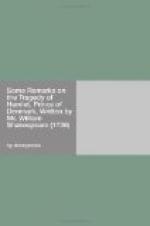Page 310.
Enter the Queen and Polonius, and afterwards Hamlet.
We are now come to a Scene, which I have always much admired. I cannot think it possible, that such an Incident could have been managed better, nor more conformably to Reason and Nature. The Prince, conscious of his own good Intentions, and the Justness of the Cause he undertakes to plead, speaks with that Force and Assurance which Virtue always gives; and yet manages his Expressions so as not to treat his Mother in a disrespectful Manner. What can be expressed with more Beauty and more Dignity, than the Difference between his Uncle and Father! The Contrast in the Description of them both, is exquisitely fine: And his inforcing the Heinousness of his Mother’s Crime with so much Vehemence, and her guilty half Confessions of her Wickedness, and at last her thorough Remorse, are all Strokes from the Hand of a great Master in the Imitation of Nature.
His being obliged to break off his Discourse by the coming in of his Father’s Ghost once more, adds a certain Weight and Gravity to this Scene, which works up in the Minds of the Audience all the Passions which do the greatest Honour to human Nature. Add to this, the august and solemn Manner with which the Prince addresses the Spectre after his Invocation of the Celestial Ministers.
The Ghost’s not being seen by the Queen, was very proper; for we could hardly suppose, that a Woman, and a guilty one especially, could be able to bear so terrible a Sight without the Loss of her Reason. Besides that, I believe, the Poet had also some Eye to a vulgar Notion, that Spirits are only seen by those with whom their Business is, let there be never so many Persons in Company. This Compliance with these popular Fancies, still gives an Air of Probability to the Whole. The Prince shews an extreme Tenderness for his Father in these Lines,
On Him! on Him! &c.
His Form and Cause conjoin’d,
&c.
and really performs all the strictest Rules of Filial Piety thro’ out the whole Play, both to Father and Mother; and particularly, to the Latter in this Scene, whilst he endeavours to bring her to Repentance. In a Word, We have in this important Scene, our Indignation raised against a vile Murderer, our Compassion caus’d for the inhuman Death of a virtuous Prince; our Affection is heighten’d for the Hero of the Play; and, not to enter into more Particulars, we are moved in the strongest Manner, by every Thing that can gain Access to our Hearts.
Hamlet’s killing Polonius, was in Conformity to the Plan Shakespeare built his Play upon; and the Prince behaves himself on that Occasion, as one who seems to have his Thoughts bent on Things of more Importance. I wish the Poet had omitted Hamlet’s last Reflection on the Occasion, viz. This Counsellor, &c. It has too much Levity in it; and his tugging him away into




